“It’s an honor top share this with you all tonight,” he told them. In addition to Mr. Mars, the winners were Christopher Brody Brown, James Fauntleroy, Philip Lawrence, Ray Charles McCullough II, Jeremy Reeves, Ray Romulus and Jonathan Yip.
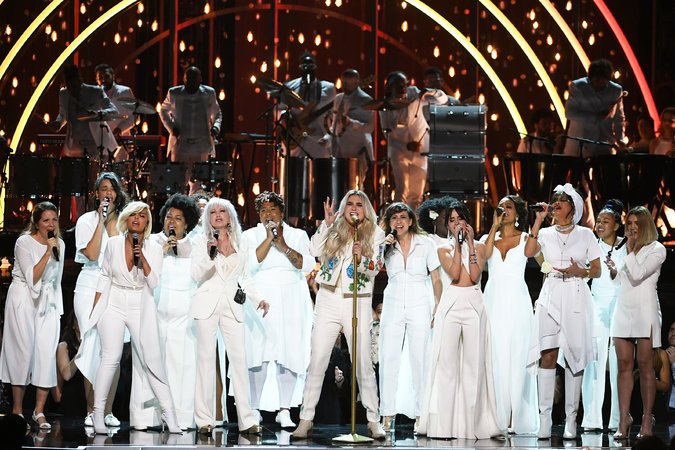
Kesha and a #MeToo moment.
In the days leading up the awards, the Grammys faced scrutiny over how the show — and the music industry at large — would respond to the #MeToo movement and the show of solidarity at the Golden Globes this month, when the women of Hollywood, wearing black, presented a united front.
Janelle Monáe Makes a #MeToo Moment at the Grammys
The recording artist, producer and actress calls for an end to harassment and workplace inequality at the 2018 Grammy Awards.
By CBS/RECORDING ACADEMY on Publish Date January 28, 2018. Photo by Lucas Jackson/Reuters… Watch in Times Video »
In a forceful speech, the singer and actress Janelle Monáe spoke for the women of the music industry, calling for a unified response of the women in music against sexism and sexual harassent, saying, “We come in peace but we mean business.”
“You see, it’s not just going on in Hollywood, it’s not just going on in Washington,” she said. “It’s right here in our industry as well.”
“And just as we have the power to shape culture,” Ms. Monáe added, “we also have the power to undo a culture that does not serve us well.”
Then Kesha sang “Praying,” her ballad of anger and redemption, surrounded by women all in white, including the singers Cyndi Lauper, Camila Cabello, Julia Michaels and Andra Day and the Resistance Revival Chorus, a collective of women who sing protest songs. Kesha became pop’s symbol of the fight against sexual assault when, in a 2014 lawsuit, she accused her producer, Dr. Luke, of inflicting years of abuse. (Dr. Luke, whose real name is Lukasz Gottwald, in turn accused Kesha of fabricating the story in an attempt to escape her recording contracts.)
Her voice breaking, Kesha sang “You brought the flames and you put me through hell,” and “When I’m finished, they won’t even know your name.”
Advertisement
Continue reading the main story
As she finished, she held back tears and the choir gathered around her in a group embrace.
Immediately afterward, Camila Cabello, a young Cuban-Amerian singer who had been part of Kesha’s segment, introduced a segment highlighting immigration, with the cameras turning to a view of the Statue of Liberty and Emma Lazarus’s poem “The New Colossus” (“Give me your tired, your poor, / Your huddled masses yearning to breathe free”). Then U2 performed its song “Get Out of Your Own Way” on a barge in New York harbor. (The performance had been taped two nights before.)
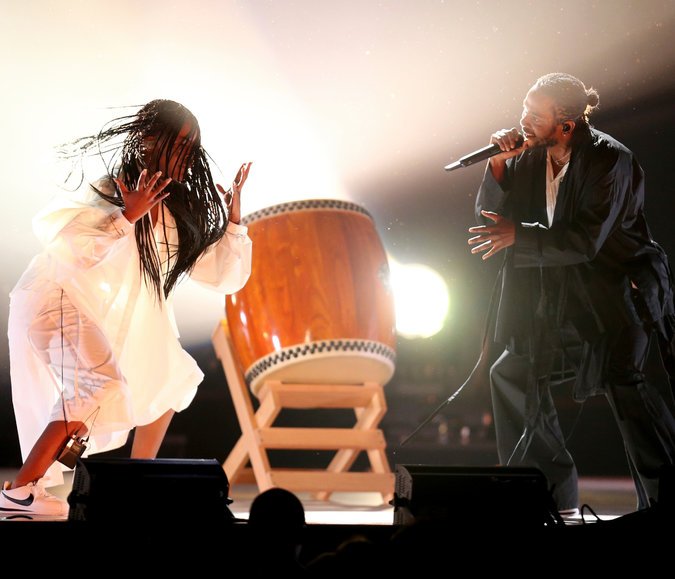
A striking opening.
The 60th annual Grammy Awards opened with a striking conceptual performance by Kendrick Lamar and by Bono and the Edge of U2, with Dave Chappelle serving as a one-man Greek chorus. It walked a fine line between confrontational political commentary and grounding comedy.
Mr. Lamar began surrounded by phalanxes of soldiers in camouflage fatigues as he began his song “XXX” with images of American flag waving behind him on digital screens. After the words “This is a satire by Kendrick Lamar” flashed behind him, and a brief appearance by Bono and the Edge, the camera cut to Mr. Chappelle, who said: “The only thing more frightening than watching a black man be honest in America is being an honest black man in America.”
The show then alternated again between Mr. Lamar and Mr. Chappelle, before ending with Mr. Lamar standing among men in red hoodies who were gunned down one by one.
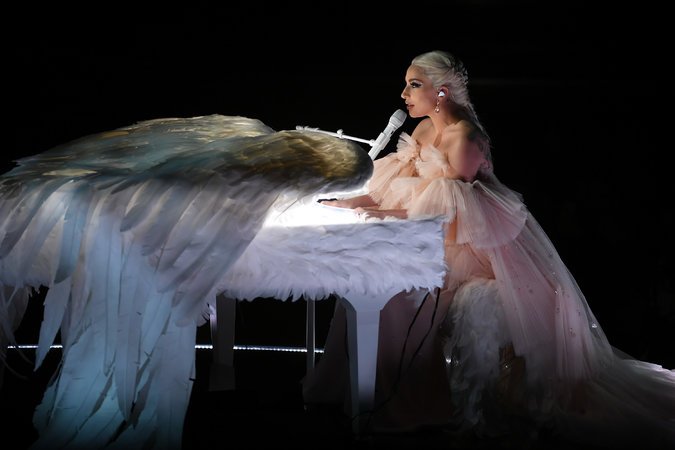
Lady Gaga then took the stage to sing her ballads “Joanne” and “Million Reasons” at a white piano draped with the wings of a bird or an angel. “Time’s up,” she said.
Mr. Lamar then took the first prize of the night, for best rap/sung performance, for “LOYALTY.,” featuring Rihanna, who told him: “Congrats. You deserve this, man.”
Accepting the award for best rap album, Mr. Lamar delivered a paean to hip-hop itself, which, he said, had “showed me the true definition of what an artist was.”
Slide Show
2018 Grammys Red Carpet: See All the Arrivals
Keep refreshing as we update this slide show with looks from the music industry’s big night.
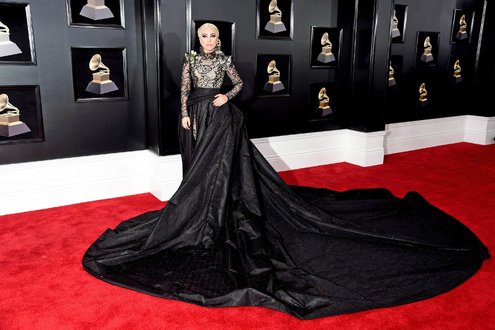
“From the jump I thought it was about the accolades, and the cars and the clothes,” Mr. Lamar said. “But it’s really about expressing yourself, putting that paint on the canvas for the world to evolve for the next listener, the next generation after that.”
Advertisement
Continue reading the main story
Then he paid tribute to his artistic heroes, including Jay-Z, Nas and Puff Daddy, and added, as the ultimate obeisance: “Jay for president.”
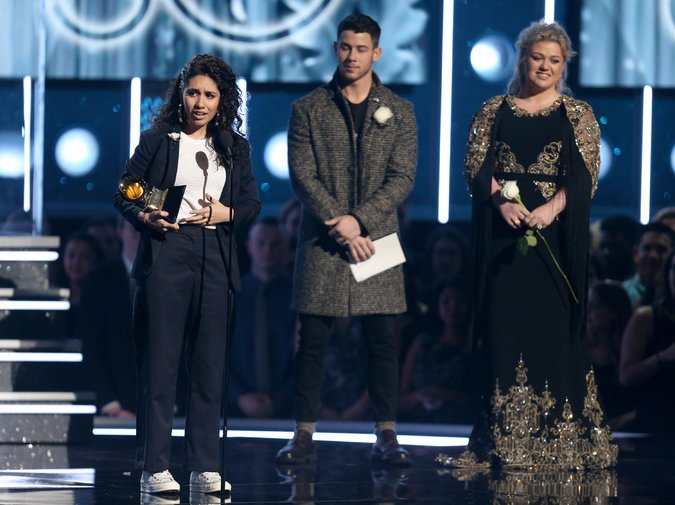
Alessia Cara wins best new artist.
Alessia Cara, a 21-year-old Canadian pop singer who has songs of empowerment like “Scars to Your Beautiful.” After the microphone was lowered reach her, Ms. Cara, who was also wearing a white rose, said: “Holy cow, I’m shaking. I’ve been pretend-winning Grammys since was a kid, like in my shower.”
All but nine of the 84 awards were given out at a nontelevised ceremony in the afternoon.
During the preshow ceremony, Mr. Lamar won best rap performance, best rap song and best music video, all for “HUMBLE.” Mr. Mars won best RB performance and RB song for “That’s What I Like,” and best RB album for “24K Magic.”
Mr. Lamar and Mr. Mars will face each other for both record and album of the year, although their greatest competition in those categories — and, for Mr. Mars, in song of the year, a songwriters’ award — may be Jay-Z, who now holds the position of a deeply respected elder. Despite 21 past wins, he has never taken home a Grammy in the top categories. Jay-Z had the most nominations of any artist this year, with eight, and was feted as an “industry icon” at Clive Davis’s glittery annual pre-Grammy party.
Ed Sheeran, who was snubbed in the top categories, was awarded best pop vocal album, in absentia, for “÷,” one of last year’s biggest hits. He also won best pop solo performance for “Shape of You.” Childish Gambino won best traditional RB performance for his song “Redbone,” a 1970s funk throwback that was a surprise hit at radio last year.
The country singer-songwriter Chris Stapleton won two awards in the preshow ceremony: best country solo performance for “Either Way,” and best country song for “Broken Halos,” which Mr. Stapleton wrote with Mike Henderson.
Jason Isbell also won two: best Americana album, for “The Nashville Sound,” and best American roots song, for “If We Were Vampires.” Carrie Fisher won a posthumous Grammy — her first — in the best spoken word album category, for “The Princess Diarist.”
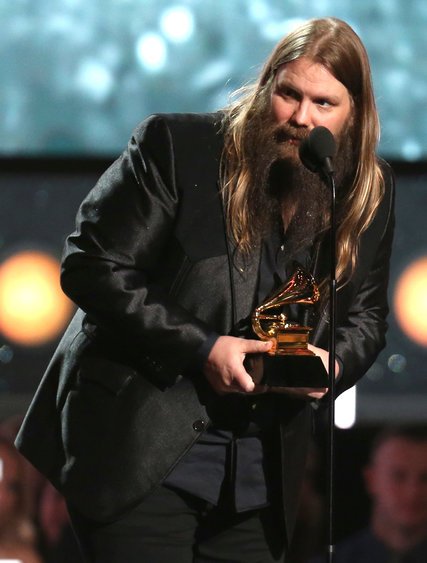
Chris Stapleton wins and victims of violence are honored
After Mr. Stapleton won best country album for “From a Room: Volume 1,” the country singers Eric Church, Maren Morris and the Brothers Osborne offered a tribute to the victims of violence at music events.
Advertisement
Continue reading the main story
Ms. Morris began the introduction drawing a connection between the bombing in Manchester, England, last May and the shooting at a country music festival in Las Vegas in October.
“All country music was reminded in the most tragic way,” Mr. Church said, the connection we share with our fans and the healing power of music will always provide.”
As they played a quiet and stripped-down version of Eric Clapton’s “Tears in Heaven,” the names of individual victims were displayed on glowing panels behind them, as if electronic votive candles.
A night of questions new and old.
By the end of Sunday night, the music world will have some answers: Will Jay-Z or Mr. Lamar score a big victory for rap? Will “Despacito” break new ground for Spanish-language pop? Is Bruno Mars the next Adele?
The Grammys are being held in New York for the first time in 15 years. To mark its return, Patti LuPone and Ben Platt (“Dear Evan Hansen”) will perform a Broadway-style tribute to Leonard Bernstein and Andrew Lloyd Webber. But regardless of where the show is held, many of the big questions remain.
[Never miss a pop music story: Sign up for our weekly newsletter, Louder.]
The Grammys, like most awards shows, have been wrestling for years with issues of diversity: ethnic, gender and, in the Grammys’ case, musical. Not so long ago, the show drew eye rolls for over-rewarding elder heroes at the expense of pop’s younger, more vital mainstream. (Think Ray Charles beating Green Day and Kanye West in 2005, or Herbie Hancock defeating Amy Winehouse and, ahem, Mr. West in 2008.)
The Grammys have generally gotten much better at recognizing the pulse of contemporary music. A diverse crop of nominees this year means it is very likely that the winners of the four most prestigious categories — album, record and song of the year, and best new artist — will not be white men.
At the same time, gender is very much still an issue. Lorde is the only woman up for album of the year, facing Jay-Z, Mr. Mars, Mr. Lamar and Childish Gambino. Julia Michaels and Ms. Cara have credits in the song of the year category (which recognizes songwriters). Otherwise, the top nominees are predominantly male. As a new report indicated, gender diversity at the Grammys — and in the music industry at large — has been abysmal.
Advertisement
Continue reading the main story
The marquee categories have big stars.
The top categories are stacked with popular and critically respected releases. Jay-Z has a chance to sweep with his album “4:44,” a reflective and confessional work that may finally give him an edge with more traditional voters. But for album, record and song of the year, Jay-Z also faces Mr. Mars (“24K Magic”), whom the industry admires as an all-around, lovable entertainer.
For both record and song of the year, Jay-Z and Mr. Mars also face competition from “Despacito,” the flirty ballad from Luis Fonsi and Daddy Yankee (in a remix featuring Justin Bieber) that set streaming records; a win would be perceived as a triumph for the once-again-burgeoning world of Spanish-language pop.
Don’t forget Mr. Lamar, the most respected rapper of his generation. Still, the dark horse may be Lorde, who emerged as a Grammy winner four years ago (“Royals”) and still has broad support in the Recording Academy, the organization that bestows the awards.
Why Hasn’t the Music Industry Had a #MeToo Moment?
This awards season, the conversation in Hollywood has been about #MeToo and #TimesUp. But the music business has been relatively quiet.
By YOUSUR AL-HLOU, SARAH STEIN KERR and MELENA RYZIK on Publish Date January 26, 2018. . Watch in Times Video »
The white roses.
The #MeToo movement holding men accountable for sexual harassment and assault has come to Hollywood, politics and the news media, but its impact on the music world has been minimal. As the Grammys approached, it became clear that aside from the performance by Kesha, the industry had no organized response planned along the lines of the Time’s Up campaign that was front and center at the recent Golden Globes.
That changed just days ago, when a small group of midlevel female music executives called for artists to wear a white rose to the show, as a sign of “hope, peace, sympathy and resistance.” By Thursday, a handful of stars including Lady Gaga and Kelly Clarkson had pledged their support. On Sunday, the group circulated a list of music-industry professionals and artists who had signed on to the effort, adding Pink, Dua Lipa and Lil Uzi Vert, among others.
At the preshow ceremony, several artists wore white roses, although their comments about it were muted. Reba McEntire, the country star, was asked about the white rose on her dress after she won best roots gospel album for “Sing It Now: Songs of Faith Hope.”
“My message is, I want to treat you like I want to be treated,” Ms. McEntire said. “It’s the golden rule. I think if we did that more often, a lot of these problems would be nonexistent. Let’s just treat people kindly.”
Lisa Loeb, who won best children’s album, said, only half in jest: “I know some people are saying the music industry took a little while to catch up with some of the other industries. But we haven’t had as many awards ceremonies.”
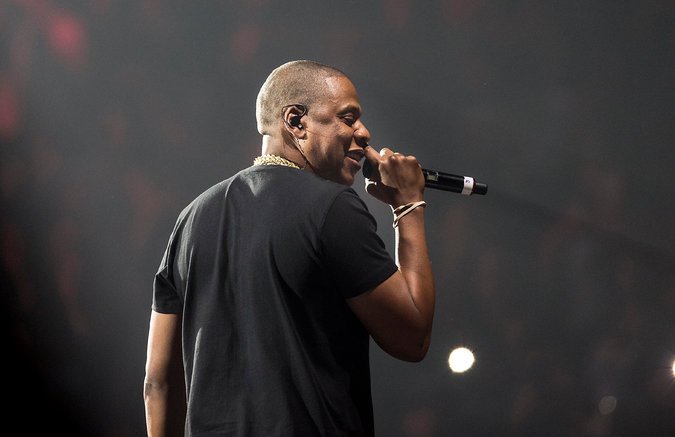
A preshow controversy.
Hours before the show began, it already had a Trump controversy. On Saturday night, CNN aired an interview with Jay-Z as part of the inaugural episode of “The Van Jones Show,” in which Jay-Z commented on the president’s reported denigration of Haiti and African countries.
Advertisement
Continue reading the main story
“It is disappointing and it’s hurtful,” Jay-Z said. “Because it’s looking down at a whole population of people and it’s so misinformed because these places have beautiful people and beautiful everything. This is the leader of the free world speaking like this.”
By 8:18 a.m. Sunday, the president fired off his response on Twitter.
Somebody please inform Jay-Z that because of my policies, Black Unemployment has just been reported to be at the LOWEST RATE EVER RECORDED!
— Donald J. Trump (@realDonaldTrump) Jan. 28, 2018
A little more than an hour later, Mr. Jones — who is managed by Jay-Z’s company, Roc Nation — wrote on Twitter in response, noting that he did ask Jay-Z about the president’s record on reducing black unemployment, and Jay-Z responded that the issue was about treating people with respect and not, as he put it: “Treat me really bad and pay me well.”
Someone needs to inform @realdonaldtrump that I ALREADY asked Jay Z whether black employment figures redeem Trump’s presidency. And Jay’s answer last night on the #VanJonesShow was POWERFUL !!! … Watch the VIDEO for yourself: https://t.co/7Sv3rHKkmW https://t.co/jbHpkKOM5o
— Van Jones (@VanJones68) Jan. 28, 2018
If Jay-Z gets an acceptance speech, eyes will be on him for a response.
And some of the stars at the preshow ceremony seized the opportunity to make political or personal statements.
Residente, a Puerto Rican rapper who founded the influential group Calle 13, won best Latin rock album (for “Residente”). Dedicating his prize “to my country, Puerto Rico,” he spoke about the need to seek out reliable sources of news about the island.
“What’s happening in Puerto Rico is horrible,” he said. “We’ve been without electricity for six months now. Some people are dying because they are not eating well. All of that, I had it in my heart when I won this a moment ago.”
Cécile McLorin Salvant, a Haitian-American singer who won best jazz vocal album, addressed President Trump’s comments about Haiti and Africa. “At some points you have to either laugh or cry,” she said. “I choose to laugh.”
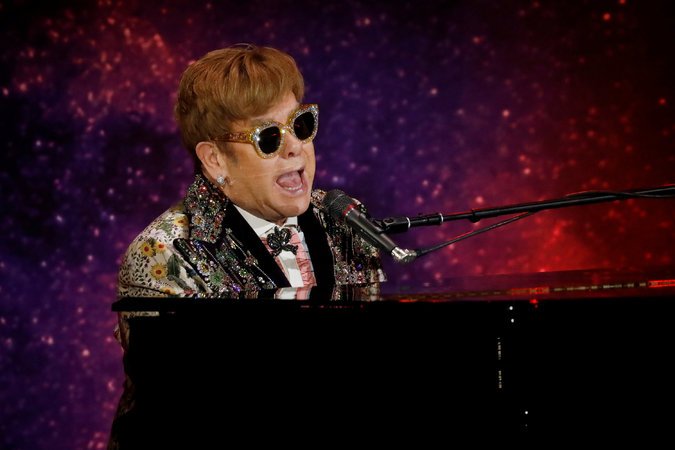
Paying tribute to stars.
For a year that saw the losses of Chuck Berry, Fats Domino, Tom Petty, Chris Cornell, Chester Bennington of Linkin Park, Malcolm Young of AC/DC and Walter Becker of Steely Dan, expect some notable “in memoriam” tributes.
Advertisement
Continue reading the main story
There were also tributes out of sight of the cameras. After a 40th anniversary edition of the Voyager Golden Record — the gold discs sent into space containing the sounds of the earth, including Chuck Berry’s “Johnny B. Goode” — won best box set package, Lawrence Azerrad, one of the album’s art directors, commented on the everlasting life of Berry’s music.
“Long after the earth is gone, swallowed up by the sun,” he said, “Chuck Berry’s record will still be floating in space.”
Absent from the stage.
While many stars will pack the stage, the Grammys will also be notable for who isn’t there. Besides Mr. Sheeran, neither Taylor Swift nor Justin Bieber were in attendance.
Jay-Z and Lorde were in the audience but are not expected to perform.
Scheduling, limitations of time and space, and the whims of performers and producers may well account for many of these absences. But in recent years, the Grammys have also faced boycotts from some artists who feel that not enough of the top prizes go to black artists. Frank Ocean stated that in regards to last year’s show.
And while Drake has said that the reason he is not performing is that the Grammys asked him to cancel one of his own shows to appear, he also did not submit his latest “playlist” album, “More Life,” for award consideration.
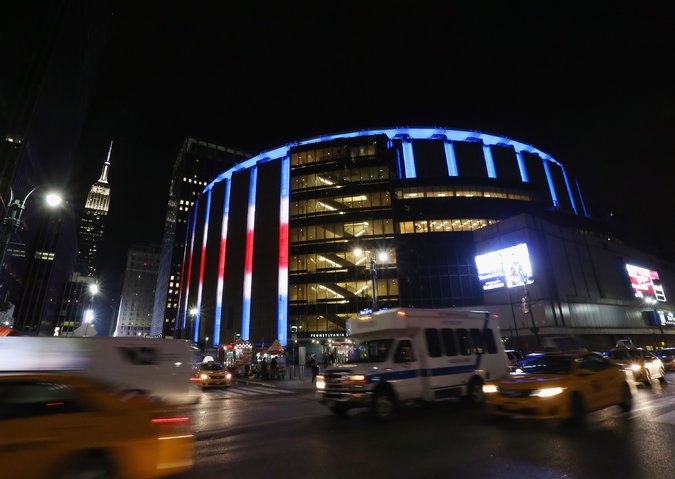
New York, New York.
The Grammys have not been in New York since 2003, when the city was still struggling to attract business and tourism after the Sept. 11 terrorist attacks. Since then, the awards’ home has been the Staples Center in Los Angeles, where its deep connections are visible from the bronze plaques on sidewalks around the complex commemorating past winners.
The New York mayor’s office lobbied hard to bring back the Grammys, which, according to some estimates, can yield as much as $200 million in economic benefits for their host city. But tensions have flared in recent weeks, with the Recording Academy accusing the city of not making good on millions of dollars in promised fund-raising.
The show — which for a second time is being hosted by Mr. Corden — made use of New York as a backdrop, but the awards have already committed to the Staples Center for the next four years.
Continue reading the main story
Article source: https://www.nytimes.com/2018/01/28/arts/music/grammy-awards.html?partner=rss&emc=rss
Speak Your Mind
You must be logged in to post a comment.